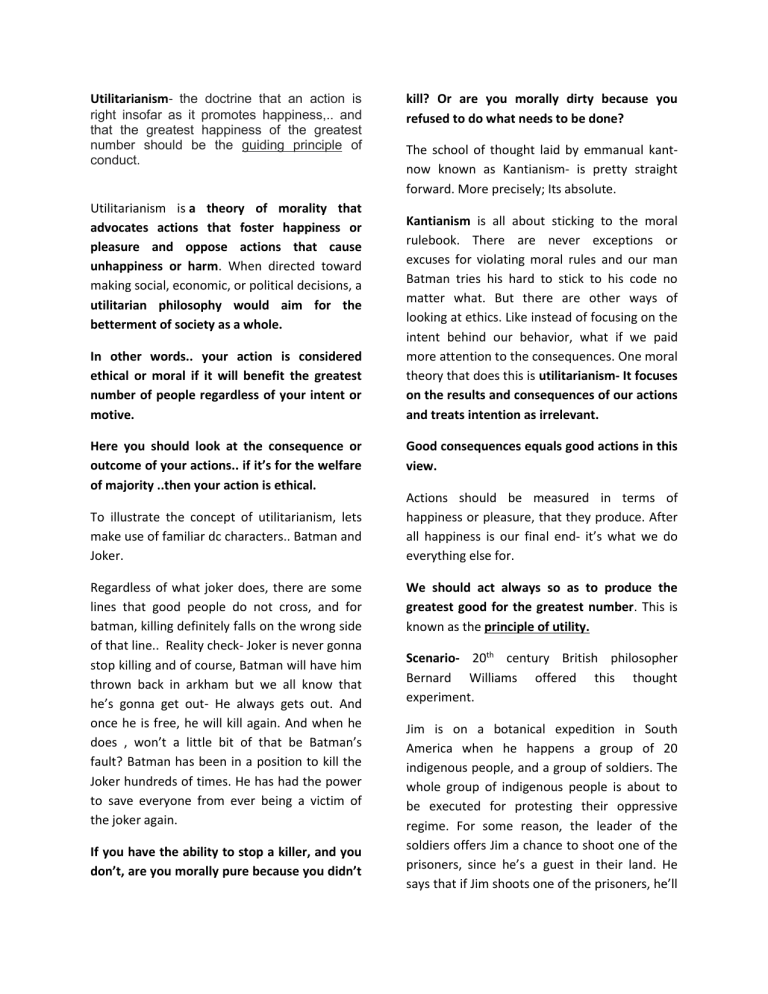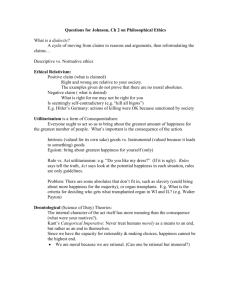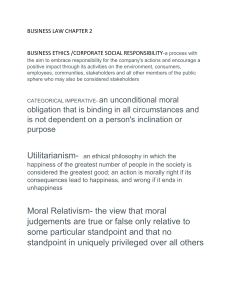Utilitarianism vs. Deontology: Ethics Lecture Notes
advertisement

Utilitarianism- the doctrine that an action is right insofar as it promotes happiness,.. and that the greatest happiness of the greatest number should be the guiding principle of conduct. Utilitarianism is a theory of morality that advocates actions that foster happiness or pleasure and oppose actions that cause unhappiness or harm. When directed toward making social, economic, or political decisions, a utilitarian philosophy would aim for the betterment of society as a whole. In other words.. your action is considered ethical or moral if it will benefit the greatest number of people regardless of your intent or motive. Here you should look at the consequence or outcome of your actions.. if it’s for the welfare of majority ..then your action is ethical. To illustrate the concept of utilitarianism, lets make use of familiar dc characters.. Batman and Joker. Regardless of what joker does, there are some lines that good people do not cross, and for batman, killing definitely falls on the wrong side of that line.. Reality check- Joker is never gonna stop killing and of course, Batman will have him thrown back in arkham but we all know that he’s gonna get out- He always gets out. And once he is free, he will kill again. And when he does , won’t a little bit of that be Batman’s fault? Batman has been in a position to kill the Joker hundreds of times. He has had the power to save everyone from ever being a victim of the joker again. If you have the ability to stop a killer, and you don’t, are you morally pure because you didn’t kill? Or are you morally dirty because you refused to do what needs to be done? The school of thought laid by emmanual kantnow known as Kantianism- is pretty straight forward. More precisely; Its absolute. Kantianism is all about sticking to the moral rulebook. There are never exceptions or excuses for violating moral rules and our man Batman tries his hard to stick to his code no matter what. But there are other ways of looking at ethics. Like instead of focusing on the intent behind our behavior, what if we paid more attention to the consequences. One moral theory that does this is utilitarianism- It focuses on the results and consequences of our actions and treats intention as irrelevant. Good consequences equals good actions in this view. Actions should be measured in terms of happiness or pleasure, that they produce. After all happiness is our final end- it’s what we do everything else for. We should act always so as to produce the greatest good for the greatest number. This is known as the principle of utility. Scenario- 20th century British philosopher Bernard Williams offered this thought experiment. Jim is on a botanical expedition in South America when he happens a group of 20 indigenous people, and a group of soldiers. The whole group of indigenous people is about to be executed for protesting their oppressive regime. For some reason, the leader of the soldiers offers Jim a chance to shoot one of the prisoners, since he’s a guest in their land. He says that if Jim shoots one of the prisoners, he’ll let the other 19 go. But if Jim refuses,the soldiers will shoot all 20 protesters. The theory clearly demands that Jim shoot one man so that 19 will be saved. But William argues that no moral theory ought to demand the taking of an innocent life. William further argues that it’s not Jims fault that the head soldier is a total dirt bag and Jim shouldn’t have to get literal blood on his hands to try and rectify the situation. Utilitarianism says, we live in a world where sometimes people do terrible things. And if we are the ones who happen to be there, and we can do something to make things better, we must. Even if that means getting our hands dirty. And if I sit by and watch something bad happen when I could have prevented it, My hand are dirty anyway. So Jim should not think about it as killing one man.That man was dead already, because they were all about to be killed. Instead, Jim should think of his decision as doing what it takes to save 19 people. Act Utillitarianism- In any given situation, you should choose the action that produces the greatest good for the greatest number. Regardless of the nature of the intent. Rule utilitarianism- This version of the theory says that we ought to live by the rules that in general are likely to lead to the greatest good for the greatest number.Rule utilitarianism wants us to think long term and on a larger scale. So here we have to follow rules that will maximize utility for the majority of the time. Deontology- defined as an ethical theory that the morality of an action should be based on whether that action itself is right or wrong under a series of rules, rather than based on the consequences of the action. Morality is determined by the act itself. the rightness of an action depends not on its consequences but on whether it accords with a moral rule, one that can be willed to be a universal law. Deontological (duty-based) ethics are concerned with what people do, not with the consequences of their actions. Do the right thing. Do it because it's the right thing to do. Don't do wrong things. Avoid them because they are wrong. Accordingly, deontological ethics holds that it may be our duty to refrain from performing certain actions (like killing and stealing) irrespective of what the consequences of doing so will be – it is, for instance, typically morally prohibited to actively and deliberately kill someone even when this is the only way to ... The appeal of deontology lies in its consistency. By applying ethical duties to all people in all situations the theory is readily applied to most practical situations. By focussing on a person’s intentions, it also places ethics entirely within our control – we can’t always control or predict the outcomes of our actions, but we are in complete control of our intentions. Others criticise deontology for being inflexible – by ignoring what is at stake in terms of consequences, some say it misses a serious element of ethical decision-making. Deemphasising consequences has other implications too – can it make us guilty of ‘crimes of omission’? Kant, for example, argued it would be unethical to lie about the location of our friend, even to a person trying to murder them! For many, this seems intuitively false. Or in case of self defense..pag napatay mo yung aggressor for defending yourself will your action be considered immoral or unethical? One way of resolving this problem is through an idea called threshold deontology, which argues we should always obey the rules unless in an emergency situation, at which point we should revert to a consequentialist approach. SUMMARY: 1.Utilitarianism and deontology are two known ethical systems. 2.Utilitarianism revolves around the concept of “the end justifies the means,” while deontology works on the concept “the end does not justify the means.” Deontological ethics is an ethics system that judges whether an action is right or wrong based on a moral code. Consequences of those actions are not taken into consideration. This ethics system is intended to be precise and by the book. Doing the right thing means to follow proper rules of behavior and, by doing so, promoting fairness and equality. That would be all for these topics .. I hope malinaw. I will be including the types of justice in your midterm exam. We have already discussed those types of justice, the need based justice, merit based justice,justice as equality, criminal justice. I will post lecture notes for your reviewer.






